If you’ve ever had a cat, the you probably know they have a special fascination with bathrooms. Perhaps you’ve been wondering why your cat constantly follows you to the bathroom. Is it a sign of love, or do cats just love disturbing your privacy?
This article will explain 5 different reasons why your cat follows you to the bathroom. We will go through some interesting research studies, cats natural instincts, all the way to how they form bonds with their fellow humans and why they are actually a lot more social than we think!
Continue reading to learn more!
5 Reasons Why Your Cat Follows You To The Bathroom:
1. Cats Are Naturally Curious
Cats evolved to be highly curious, an instinct that helped them escape predators for centuries. They like to discover new places, and they are very aware of their surroundings, especially the hidden ones.
The need for cats to explore new places is deeply rooted in their strong survival instincts, which they inherited from their wild ancestors.
Most cats cannot stand closed doors. It prevents them from not only reaching new places, but finding out what’s happening in area where they feel secure. Because a closed door represents an obstacle, it makes them feel uncomfortable.
Cats like to be involved in whatever it is you’re doing on the other side of the door.
If you’re hiding behind a closed door then, for all they know, they could be missing out on a great activity with their favorite person. If they hear a noise on the other side of the door, they want to know what’s going on.
Check out this fun TED-Ed video on your cat’s curiousity:
2. Cats Are Very Territorial
Cats are not just very curious creatures, they are also very territorial, and mark their territory in many ways – through scent rubbing against you or the furniture, scratching objects and surfaces, spraying urine and so on.
It is extremely important that cats know where everything is, and cats will be very concerned and cautious if you make intrusions into their area, a core territory where they feel safe and secure, which a bathroom is a part of.
Closing a bathroom door prevents cats from being able to access all parts of their own territory which is something that territorial creatures hate.
Recently, a scientific study researched domestic cat movement by fitting over 900 cats with GPS trackers. The results were pretty interesting:
- More than 50% of the cats stayed within about 2.5 acres (the area of two American football fields)
- About 10% of cats abandoned the garden and spent most of their time in natural habitats
- About 7% covered more than 25 acres
“I was surprised at how little these cats moved,” says lead author Roland Kays of the North Carolina Museum of Natural Sciences. “Most of them spent all their time within 100 meters [330 feet] of their yard.”
In other words, the study has shown the importance of territory for cats, and, taking the following words from Veterinarian Dr. Kathryn Primm, who says cats are “micro-managers”:
“Your home is your cat’s territory and the bathroom is within the boundary of his sphere of influence. How dare you shut him away from his own territory?”
Dr. Kathryn Primm
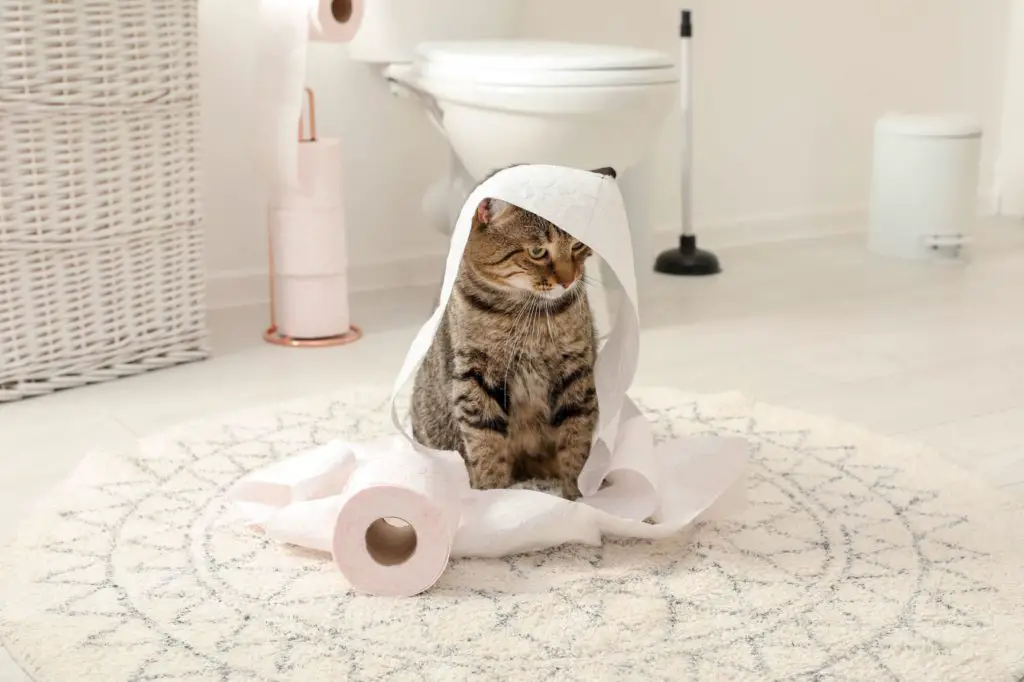
3. Cats Are Highly Social Animals
Even though many people characterize cats as reserved, introverted, and withdrawn animals, cats are quite social, much more than we tend to think.
Recently, a new study suggested that cats are just as strongly bonded to us as dogs or infants, vindicating cat lovers across the land.
Furthermore, another study published in the journal Behavioral Processes at the Oregon State University has shown that cats adjust their behavior depending on how much time we spend with them.
“The more we find out about cats, the more we’re seeing that they are social creatures and that social bonds are really important for them,” says Kristyn Vitale, the lead author of the paper and an animal behavior scientist at Oregon State University.
Cats follow you around because they feel safe with you and think of you a part of their family. But it’s not just that cats follow you to the bathroom because they like your companionship or that they want to intrude your privacy – cats want to know what kind of things you’re doing because they look up to you, and they want to learn from you!
The idea of locking yourself away in your bathroom and not sharing who you are with them is very strange to your cat.
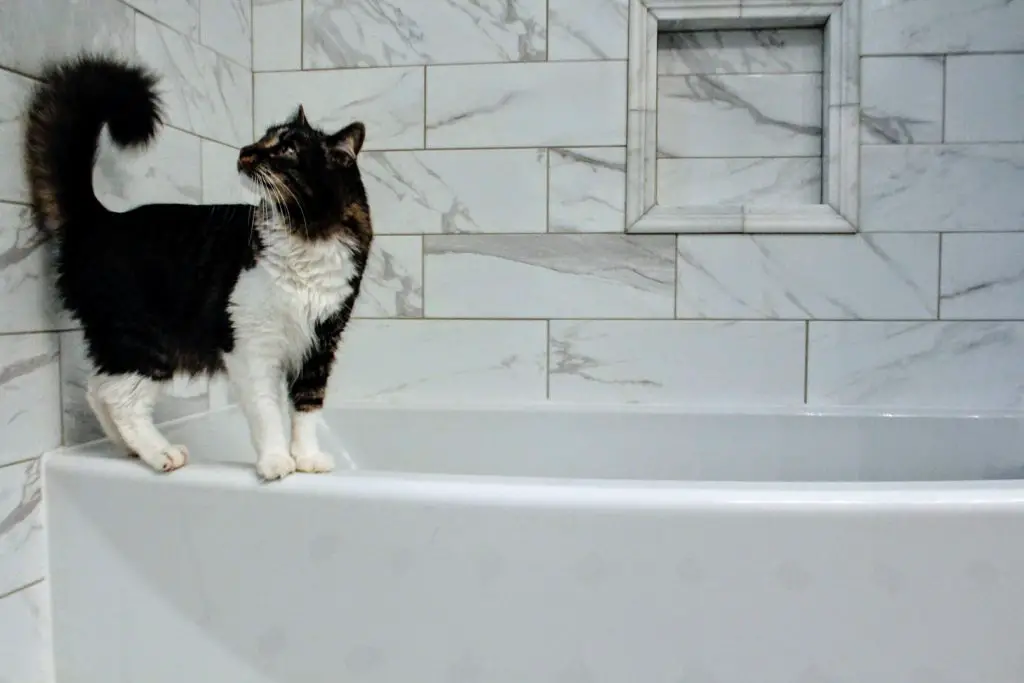
4. Cats Have An Increased Sense Of Smell
Even though cats have as many as 200 million odor-sensitive cells in their noses compared to only 5 million for humans (which is 40x more scent receptors!), cats are not just more sensitive to scent.
Scent, for cats, is their primary way of identify the environment.
Cat’s visual acuity is 10 times less than that of humans and the sense of smell plays has replaced this, as they adapted to be highly-efficient predators, and plays a huge role in identifying the world around them.
The bathroom, of course, is a place full of the smell of you – your cat’s favorite human!
When you close the doors of the bathroom, you spend time doing important things, at least in the mind of your cat. And because smell is so important to cats, they want to know more, and they like to bond with you and your – smell!
For cats, grooming is a healthy activity that promotes healthy skin by increasing the production of sebum, an oily or waxy matter which lubricates the hair and skin of mammals. Licking spreads sebum over the hair coat and lubricates it, protecting the fur and making it shine.
Similarly, the bathroom for humans is the place where you care for yourself – where you brush your teeth, or do your hair, and cats are aware of that, and they want to know more about what this means for you!
One of the main reasons cats groom themselves is to mark territory, through the use of scent glands concentrated around their face, chin, lower ears, forehead, cheeks and so on, that produce pheromones,
Pheromone is a hormone that also plays a role in human behavior as social behaviors, and is secreted by humans skin glands, urine, anal excrement, breath, genitalia, saliva, and skin.
When you use the bathroom, a lot of this hormone is secreted, and cats naturally want to know what it means for you, what is “your territory”.
5. Cats Don’t Prefer Water
Although not all cats hate water, most cats don’t like getting wet because of what water does to their fur.
Wet fur is extremely uncomfortable for cats for a number of reasons – it is heavy, it takes a long time to dry, and it makes cats vulnerable and easier for predators to catch.
There are other reasons why cats don’t prefer water:
- Cats evolved in dry climates and had little exposure to water, and there was no advantage to forming relationships with it
- Cats may be putt of to chemicals found in water, as opposed to natural, running water
- Cats naturally have higher average body temperature, and will feel much colder in cold water than we do
For more information, check out are in-depth article on why most cats don’t like water.
When we wash our cats the water and soap neutralizes the natural scent produced from their bodies.
The idea of water on their bodies is very uncomfortable to cats, which use scent to create a familiar social and physical environment, to maintain and secure a territory, as a form of communication, and for many other reasons!
Cats know that when you wash or shower in the bathroom, your scent also goes away, or more precisely, the scent they rubbed on you, which marks you as a part of their territory from other cats.
Because cats consider their human owners as part of their family, they like to help them by getting some of the scent on their bodies as soon as possible!
“Cats are very loving animals and they lick their people as a display of affection and trust, the way they would lick littermates or their mother.”
Barbara Pezzanite, Ph.D.
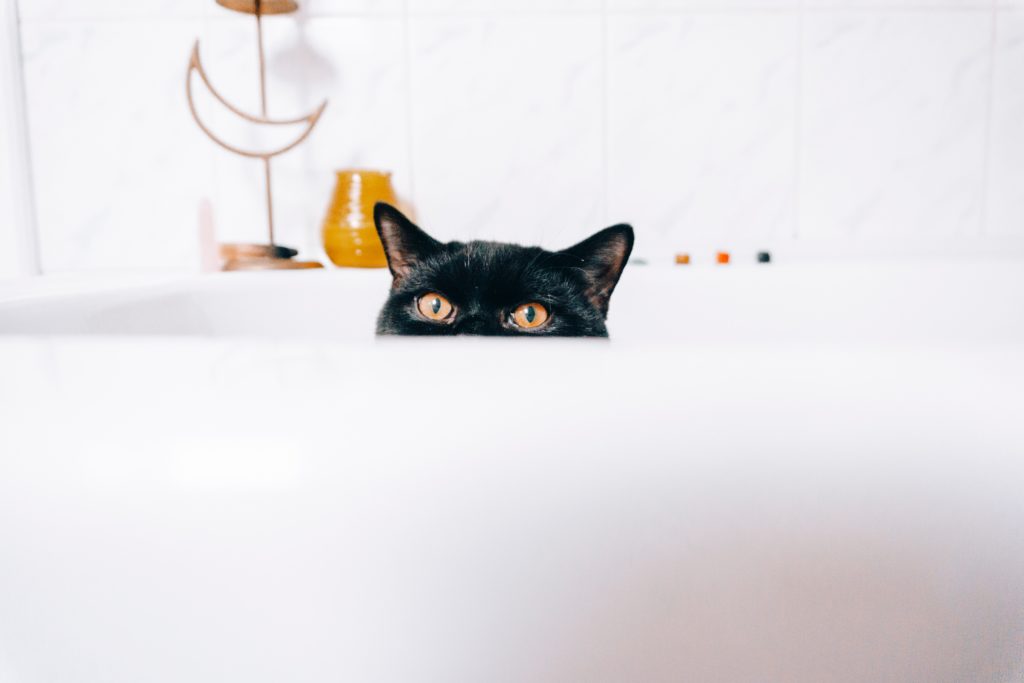
Did you like our article on 5 reasons why your cat follows you to the bathroom?
If so, make sure to comment below and let us know! You can also click on the share button and share this article on social media with your cat loving friends!
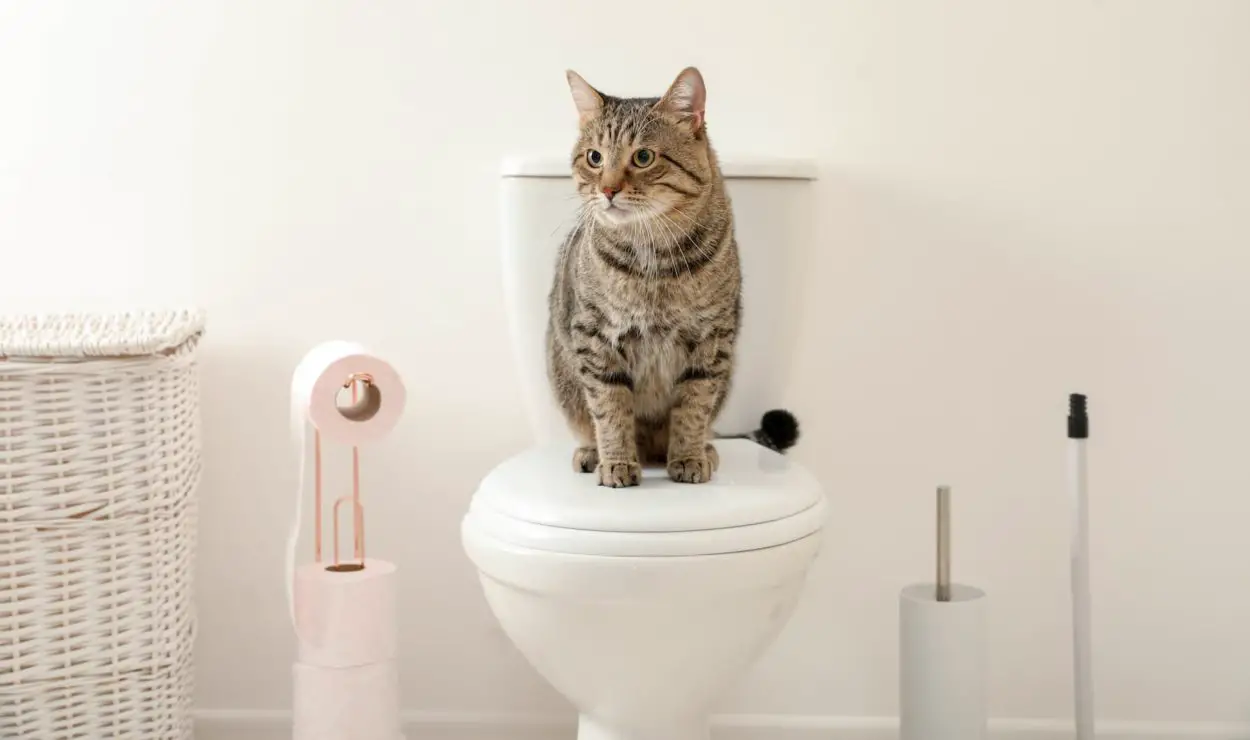
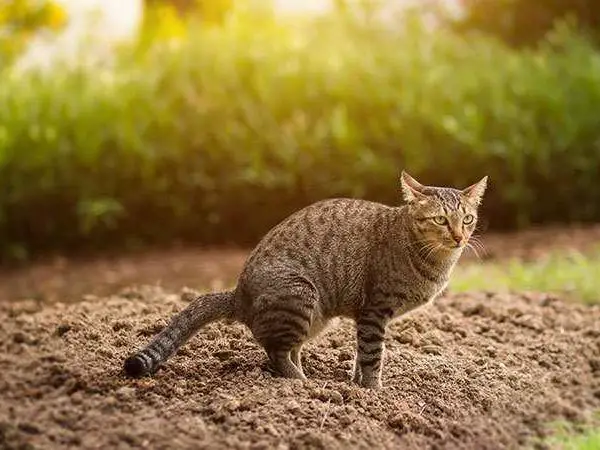

Leave a Comment